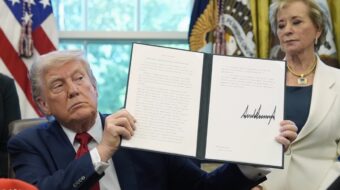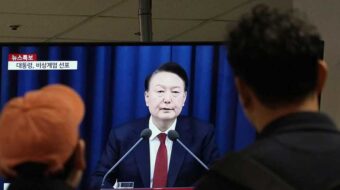Protests and a Jan. 23 one-day general strike have rocked Lebanon. Some violent incidents resulted in three deaths and 100 injuries. The violence is one factor triggering Lebanese fears of a new civil war, but there are deeper issues involved.
Today’s crisis revolves around the government headed by Prime Minister Fouad Siniora and the opposition to it. Mostly peaceful protests demanding the government step down have been going on since Dec. 1. Both sides charge each other with violating the constitution, coup plotting, not representing the people and being puppets of foreign influence.
Lebanese political representation is based on religious affiliation, with rules specifying that the prime minister, president and Parliament speaker be Muslim Sunni, Maronite Christian and Muslim Shiite, respectively. This “confessional” system has been a source of conflict for decades.
Siniora’s government is made up of mainly Sunni Muslims, Christians and Druze, which together are about 60 percent of the population. It is accused of being too pro-Western, a puppet of the U.S., Europe and to a lesser extent Saudi Arabia. The Sunni-dominated Saudi kingdom is reportedly concerned about the growing influence of Shiites and in particular Iran in the region.
The Siniora government once included Hezbollah. The government was formed after the 2005 assassination of former Prime Minister Rafik Hariri and the “Cedar Revolution,” which forced Syrian troops — there since the end of the civil war — out of Lebanon. Six ministers from Hezbollah and other parties resigned in November 2006, precipitating the current crisis.
Hezbollah leads the opposition, which includes the Free Patriotic Movement, a Christian group, as well as other Shiite parties and some nonsectarian groups. The opposition is accused of being too pro-Syrian and pawns of Iran. Shiites and the Christians aligned with the opposition represent about 40 percent of Lebanon’s population.
The Bush administration’s policies of militarism instead of diplomacy aggravate this complex situation.
During his recent State of the Union speech, Bush charged that the U.S. faces “an escalating danger from Shia extremists” controlled by Iran, whose “client” Hezbollah is “second only to al Qaeda in the American lives it has taken.”
University of Michigan Middle East expert Juan Cole said Bush’s speech showed ignorance of Shiite politics in the region. In his Informed Consent blog, Cole said Hezbollah was focused on “getting the Israelis back out of their country,” not on targeting the U.S.
“In fact,” he said, “it isn’t clear that the Lebanese Hezbollah has done anything to the U.S. for 20 years.”
Noting that Hezbollah was part of the Cedar Revolution’s government, Cole commented, “What destabilized that government was the brutal Israeli war on Lebanon of last summer. Bush collaborated in that war and even worked against the early cease-fire called for by the Siniora government.”
Cole said putting all the blame for Lebanon’s instability on Syria, as Bush has done, is “implausible.”
Meanwhile, a Jan. 25 Paris conference of more than 40 countries, global financial institutions and corporations raised $7.6 billion in loans, grants and direct support to bolster the embattled Siniora government. The biggest donors were the World Bank, European Investment Bank and Saudi Arabia. Lebanon’s national debt is $41 billion.
In return, Siniora’s government proposed a package of economic “reforms” that would hit poor and working people hard. It would end government subsidies on fuel and other necessities, resulting in skyrocketing prices. Mobile phone and electricity industries would be privatized. Consumer taxes would increase from 10 to 12 percent.
Lebanon’s 200,000-member General Confederation of Labor and Trade Unions is protesting this plan, and joined in the opposition-led general strike.
Noting that the Lebanese people have already “paid the price of privatizations,” federation President Ghassan Ghosn said labor “rejects the World Bank demands for more. We reject selling the properties of the people and the government.”
The Lebanese Communist Party called for the government to step down. The party joined with the Free Patriotic Movement to demand formation of a “temporary government with wider representation and extra legislative powers to approve a modern electoral law based on proportional representation.”
A fundamental solution, the LCP and FPM said, requires “forming of a secular democratic state, unifying the Lebanese on the bases of equal citizenship,” not on religious belief. They said eliminating corruption and resolving problems with Syria, were critical to a solution. Hezbollah has not endorsed abolishing the confessional system.
talbano @ pww.org









